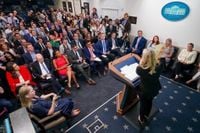Americans’ trust in the news media has reached a new and dramatic low, with just 28% of adults expressing confidence in newspapers, television, and radio to report the news fully, accurately, and fairly, according to a Gallup poll conducted in September 2025. This figure, reported by outlets including The Hill, Fox News, and GV Wire, marks the lowest level ever recorded by Gallup in nearly five decades of tracking public sentiment on this issue.
The decline is steep and relentless. Just last year, 31% of Americans said they trusted the media—a figure that itself was a historic low at the time. Five years ago, that number was 40%. Looking back further, the contrast is even more striking: when Gallup first asked about media trust in the 1970s, between 68% and 72% of Americans said they had confidence in the press. Trust remained above 50% through much of the late 20th century but began a steady slide in the 2000s, never to recover. The polling service notes that confidence notably collapsed during the divisive 2016 presidential campaign, and the highest reading in the past decade was just 45% in 2018.
The 2025 poll, conducted by telephone interviews between September 2 and 16 with a random sample of 1,000 adults from all 50 states and Washington, D.C., paints a bleak picture. A full 70% of Americans now say they have "not very much" (36%) or "none at all" (34%) confidence in the media. The margin of error is plus or minus 4 percentage points at the 95% confidence level, according to The Hill.
Partisan divides are as sharp as ever, if not sharper. Among Republicans, trust in the media has plummeted to a record low of just 8%—the first time Gallup has recorded single-digit trust in this group. In fact, Republican trust hasn’t risen above 21% since 2015, the year Donald Trump first ran for the White House. The drop is not limited to the right: Independents now mirror that distrust at 27%, matching last year’s historic low. Even among Democrats, only a narrow majority—51%—express confidence in the media, the lowest point for that group and a repeat of the low first seen in 2016.
Generational divides are equally pronounced. Older Americans, those aged 65 and above, are the most trusting, with 43% saying they have confidence in the media. But among younger Americans, the numbers are far lower. Gen Z adults (ages 18 to 29) report just 28% trust, while millennials (ages 30 to 49) are even more skeptical, with only 23% expressing confidence. Americans aged 50 to 64 also report just 28% trust. The least trusting cohort of all, according to Gallup, are millennial Republicans, with a paltry 6% saying they trust what they see, hear, or read in the news.
These findings are not just numbers—they reflect a crisis of legitimacy and relevance for the nation’s fourth estate. As Fox News reports, this is the first time in Gallup’s 50-year tracking that overall trust in the media has dropped below 30%. The data suggests that skepticism now cuts across all ages and political lines, with every demographic at or near record lows.
Gallup senior editor Megan Brenan summarized the challenge facing the industry: "With confidence fractured along partisan and generational lines, the challenge for news organizations is not only to deliver fair and accurate reporting but also to regain credibility across an increasingly polarized and skeptical public."
Media watchdogs and critics, such as Tim Graham of NewsBusters.org, point to the tone and content of political coverage as a key factor in the decline. Graham told Fox News Digital, "It’s not surprising that trust in the media keeps declining when you ask Americans if they report the news ‘fully, accurately and fairly.’ Reporting on politics often comes via a carefully prepared partisan narrative, and when facts or events depart from that narrative, they are omitted." He added, "The standards for civic discourse are very stilted. It’s considered fair and accurate to compare Donald Trump to Hitler—those so-called ‘independent fact-checkers’ don’t budge—but if you call a Democrat a ‘socialist,’ they pounce."
The White House has even cited this widespread mistrust as a reason to reserve seats at press briefings for nontraditional outlets, including podcasts, blogs, and independent digital media, according to The New York Sun.
The numbers themselves tell a story of erosion and polarization. In the 1970s, trust in media was as high as 72%, and it remained above 50% through the late 20th century. But by 2004, it had dropped to 44%. Since then, it has never again reached the majority threshold. The 2016 election cycle saw a dramatic collapse, and the trend has only continued. As of September 2025, only 28% of Americans express a "great deal" or "fair amount" of trust in the media. Seven in ten adults express skepticism, with either "not very much" or "none at all" trust.
Even within age groups, the partisan divide is evident. Among Americans 65 and older, Republicans report just 17% trust, while independents in this age group register 42%. For younger Democrats, confidence is relatively low compared to older party members, suggesting that overall trust could decrease further in the future unless Republican trust rebounds or news organizations find new ways to connect with skeptical audiences.
Gallup analysts and outside observers alike agree that the challenge is steep. The poll’s accompanying analysis states, "Given younger Democrats’ relatively low confidence in the media, overall trust could decrease further in the future, unless Republican trust rebounds. With confidence fractured along partisan and generational lines, the challenge for news organizations is not only to deliver fair and accurate reporting but also to regain credibility across an increasingly polarized and skeptical public."
With the only institution less trusted than the media being Congress, according to Gallup, the stakes for journalism’s future are high. The credibility of the press has long been considered vital to democracy, but as trust continues to erode, news organizations face an uphill battle. Whether they can restore faith among Americans—across party and generational lines—remains to be seen.
For now, the numbers speak for themselves: the American public’s trust in the news media is at its lowest ebb, with little sign of recovery on the horizon.



